
The government has set a target to raise a record high debt-financing of Rs11.10 trillion from domestic commercial and Shariah-compliant banks in the first three months of the current fiscal year. The funds will primarily be used to pay off maturing old debt and partially finance the large fiscal deficit.
This marks the third consecutive month that the government has set record high domestic borrowing targets, indicating its heavy reliance on debt to finance budgeted expenditures. However, this approach raises concerns as the debt has reached unsustainable levels, both domestically and externally, and calls for restructuring.
To address the situation, the government needs to either reduce non-development expenditures, such as cutting parliamentary budgets and curbing excessive spending, or increase revenue collection. The provisional revenue collection for the previous fiscal year stood at Rs7.14 trillion, falling short of the set target of Rs7.64 trillion.
After debt repayments, the largest expenditure for the government is interest payment on the overall debt. This leaves little room for the government to carry out development projects and generate job opportunities.
According to Bank of America Securities, Pakistan is facing an acute liquidity crisis in debt management, which directly undermines its overall financial stability. The budget parameters for the fiscal year 2023/24 reveal that debt servicing costs alone exceed Rs7.3 trillion ($25.6 billion), representing half of the total budget spending and around 80% of the country’s expected tax revenues.
Moreover, Pakistan’s total foreign exchange reserves have reached a historical low, providing coverage for only about 1.5 months of imports or two weeks in terms of liquid FX reserves. The sustainability of Pakistan’s debt is becoming increasingly problematic, despite its moderate level relative to the size of the economy.
The report suggests that Pakistan’s options to maintain financial stability using conventional policies are shrinking, and comprehensive debt restructuring may be necessary, including bilateral maturities and commercial debt.
In the first 11 months of the previous fiscal year, the federal government debt increased by a staggering 32% to Rs56 trillion, according to the latest data from the central bank.
Earlier, the government had set targets to raise a record high debt-financing of Rs10.36 trillion in June and Rs9.44 trillion in May 2023.
Out of the newly targeted gross domestic debt of Rs11.10 trillion, approximately Rs9.57 trillion will be allocated to repay maturing old domestic debt during the first three months of the fiscal year.
To achieve this, the government plans to borrow Rs8.70 trillion through the sale of three to 12-month T-bills to commercial banks, Rs1.68 trillion through auctioning one to 30-year Pakistan Investment Bonds (PIB), and an additional Rs720 billion through floating sukuk to Shariah-compliant banks.
Published in The Express Tribune, July 7th, 2023.
Like Business on Facebook, follow @TribuneBiz on Twitter to stay informed and join in the conversation.


















COMMENTS
Comments are moderated and generally will be posted if they are on-topic and not abusive.
For more information, please see our Comments FAQ